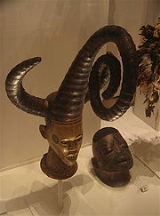
Ekoi people
Encyclopedia
Ekoi people, also known as Ejagham, are an ethnic group in the extreme southeast of Nigeria
and extending eastward into Northern Cameroon
. Ekoid Bantu languages
are spoken by many groups, including the Atam, Boki
, Mbembe, Ufia, and Yako. The Ekoi are related to the Efik, Annang
and Ibibio people
of southeastern Nigeria and have lived closely with them and also claim to have migrated from the Cameroon's to their area. The inhabitants of Kwa, located near Calabar
, claim to be the first Ekoi people to have migrated from the Cameroon's. The Ekoi are best known for their Ekpe headdresses.
. The Ekoid languages
are spoken around this area, although English (the national language) is also spoken.
. Ancestors and natural forces are also emphasized in Ekoi worship. Various Ekoi cults are devoted to the welfare of common activities, such as farming. Before the establishment of British colonial administration, the egbo was a prominent Ekoi secret society that had strong social regulatory functions as well as influence in religious matters. Members of the egbo used a form of ideographic writing called nsibidi, variations of which were formerly found among other ethnic groups in southeastern Nigeria.
is one of the Ekoid languages
, a Niger–Congo dialect cluster.
Nigeria
Nigeria , officially the Federal Republic of Nigeria, is a federal constitutional republic comprising 36 states and its Federal Capital Territory, Abuja. The country is located in West Africa and shares land borders with the Republic of Benin in the west, Chad and Cameroon in the east, and Niger in...
and extending eastward into Northern Cameroon
Cameroon
Cameroon, officially the Republic of Cameroon , is a country in west Central Africa. It is bordered by Nigeria to the west; Chad to the northeast; the Central African Republic to the east; and Equatorial Guinea, Gabon, and the Republic of the Congo to the south. Cameroon's coastline lies on the...
. Ekoid Bantu languages
Bantu languages
The Bantu languages constitute a traditional sub-branch of the Niger–Congo languages. There are about 250 Bantu languages by the criterion of mutual intelligibility, though the distinction between language and dialect is often unclear, and Ethnologue counts 535 languages...
are spoken by many groups, including the Atam, Boki
Boki
Boki may refer to:*Boki Royal Governor of Oahu*Boki, Nigeria Local Government Area in Africa*Boki people in Nigeria*Boki Milošević Serbian clarinetist*Boki Nachbar Slovenian basketball player...
, Mbembe, Ufia, and Yako. The Ekoi are related to the Efik, Annang
Annang
The Annang is a cultural and ethnic group that lives in the Coastal Southeast Nigeria...
and Ibibio people
Ibibio people
The Ibibio are a people of southeastern Nigeria. They are related to the Anaang and the Efik peoples. During colonial period in Nigeria, the Ibibio Union asked for recognition by the British as a sovereign nation . The Annang, Efik, Ekid, Oron and Ibeno share personal names, culture, and traditions...
of southeastern Nigeria and have lived closely with them and also claim to have migrated from the Cameroon's to their area. The inhabitants of Kwa, located near Calabar
Calabar
Calabar is a city in Cross River State, southeastern Nigeria. The original name for Calabar was Atakpa, from the Jukun language....
, claim to be the first Ekoi people to have migrated from the Cameroon's. The Ekoi are best known for their Ekpe headdresses.
Geography
The Ekoi in Nigeria are found in Cross River StateCross River State
Cross River State is a coastal state in southeastern Nigeria, bordering Cameroon to the east. Its capital is at Calabar, and it is named for the Cross River , which passes through the state...
. The Ekoid languages
Ekoid languages
The Ekoid languages are a dialect cluster, such as Ekajuk and Ejagham , spoken principally in southeastern Nigeria and in adjacent regions of Cameroon. They have long been associated with the Bantu languages, without their status being precisely defined...
are spoken around this area, although English (the national language) is also spoken.
Origin
The Ekoi believe that the heirs of the first settlers of their present settlement own the land; while newcomers are not allowed to buy land, they are able to purchase rights of settlement. Ekoi men have traditionally hunted, while women have engaged in agriculture, raising yams, plantains, and corn (maize). Women also fish, and both men and women participate in weaving.Rulers
Ekoi towns are ruled by councils of elders, but townspeople are free to attend meetings. Native courts that were instituted under British administration provide an appeals system outside of the decision making by the elders. Representatives from various towns sit on the courts.Ekoi mythology
The primary traditional Ekoi deities are Obassi Osaw, the sky god, and Obassi Nsi, the earth god, similar to the EfikEfik mythology
In Efik mythology, Abassi is considered to be the creator god. His wife, Atai, is known as the mediator. It is believed that Atai convinced Abassi to allow two humans , also known as their children, to live on Earth, but forbade them to work or reproduce. The children were required to return to...
. Ancestors and natural forces are also emphasized in Ekoi worship. Various Ekoi cults are devoted to the welfare of common activities, such as farming. Before the establishment of British colonial administration, the egbo was a prominent Ekoi secret society that had strong social regulatory functions as well as influence in religious matters. Members of the egbo used a form of ideographic writing called nsibidi, variations of which were formerly found among other ethnic groups in southeastern Nigeria.
Ekoi language
The Ekoi languageEkoi language
The Ekoi language, also known as Ejagham, is an Ekoid language of Nigeria and Cameroon.Ekoi is dialectically diverse...
is one of the Ekoid languages
Ekoid languages
The Ekoid languages are a dialect cluster, such as Ekajuk and Ejagham , spoken principally in southeastern Nigeria and in adjacent regions of Cameroon. They have long been associated with the Bantu languages, without their status being precisely defined...
, a Niger–Congo dialect cluster.

